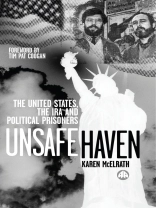For almost two hundred years the United States has been a safe haven for Irish political prisoners seeking refuge. More recently however the US government has sought deportation, extradition and prosecution to exclude Irish republicans from the country. In the first book to focus on the relationship between these tools of exclusion and US foreign policy, Karen Mc Elrath examines why this change has come about and the extent to which the granting of political asylum in the US is influenced by relations with Britain and other countries.
Karen Mc Elrath questions US government attempts to portray an impartial role in the Irish conflict, arguing that historical and contemporary evidence reveals otherwise. She shows that, far from being a neutral process, the success of bids for political asylum often depends on the relationship between the US and the government of the applicant’s country of origin. Drawing on exclusive interviews with Irish Republicans who have faced deportation or extradition from the United States, or who have been prosecuted in the US for politically-motivated offences, Mc Elrath explores the links between deportation and extradition outcomes and foreign policy issues. The tools of exclusion are defined in their historical context, and the history of US extradition law is described, with particular focus on the treaties with Britain. Mc Elrath also examines the offences for which Irish and Irish-American Republicans have been charged, discusses the various levels of support for Irish political prisoners in the US, and summarises the findings by international human rights organisations.
Table of Content
Foreword by Tim Pat Coogan
Introduction
1 History
2 Deportation and Other Immigration Controls
3 Extradition
4 Prosecution
5 Media Caricatures
6 The Facade of Neutrality
Conclusion
Notes
Bibliography
Appendix: Murder Victims of Loyalist Violence 1996–99
Index
About the author
Karen Mc Elrath lectures in Sociology and Social Policy at The Queen’s University of Belfast. She is the co-editor of The American Drug Scene (OUP, 1998), and has written widely on criminology, criminal justice, law and drug use.












